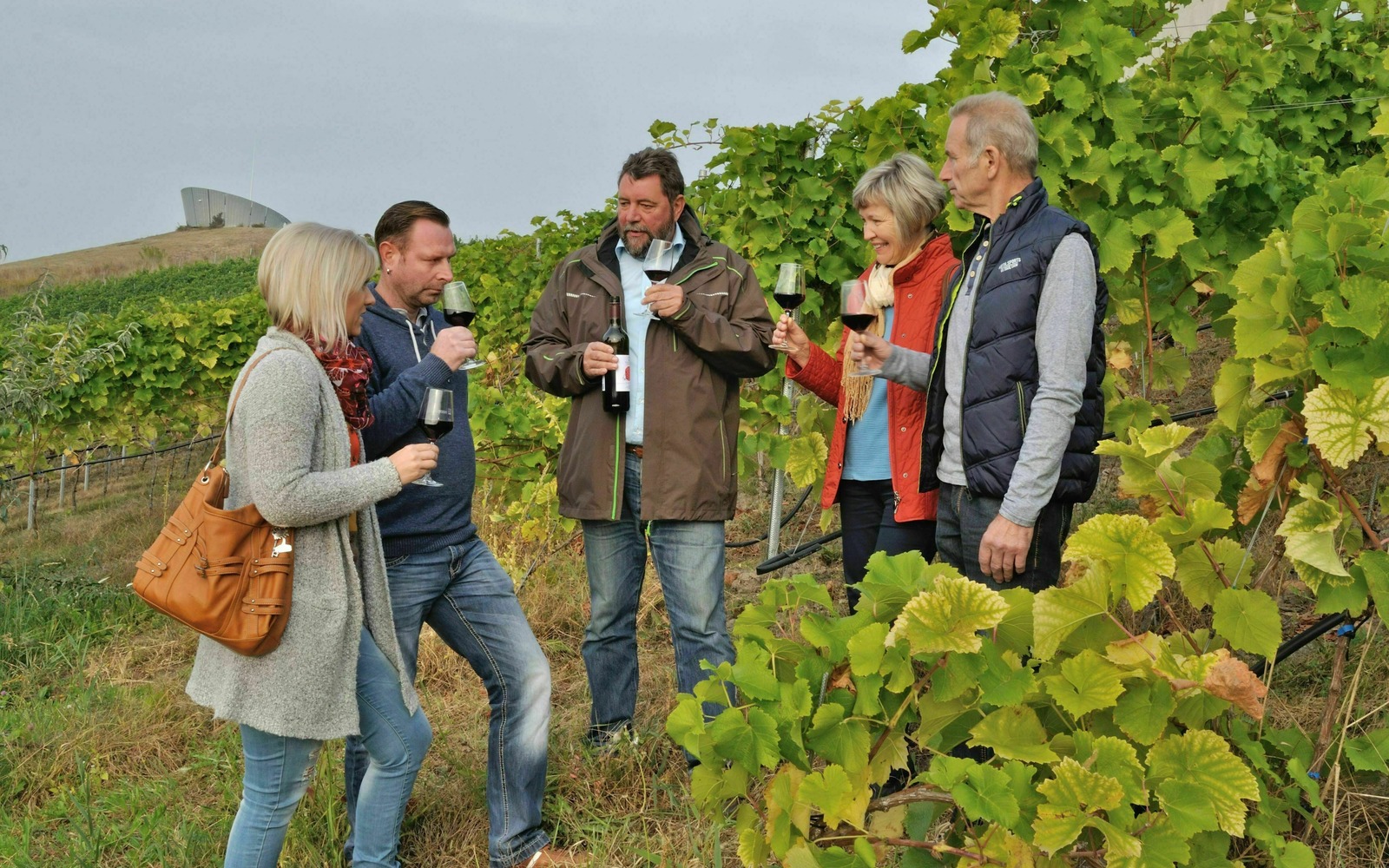New wine from new vineyards
The spectacular transformation of the Lusatian Lakeland landscape opens up completely new possibilities for tourism – and also for winegrowing. Pioneering vintners are reconnecting with the region’s ancient winegrowing traditions, and growers and drinkers celebrate the new terroirs at lively wine festivals in autumn.
Lusatia was dominated by opencast mining for over 150 years. When the excavators disappeared from the mines and new ideas for using the land were needed, many remembered the region’s centuries-old winegrowing heritage. It began in the 13th century with the first vineyards in Lower Lusatia, and reached its peak in the 16th before coming to an end in the 20th century. But the old traditions have been revived since the start of the new millennium and young vines are now growing on the slopes created by former opencast mines. In autumn, winegrowers and organisers invite visitors to take part in wine festivals, the grape harvest, and tours and wine tastings.
The Lusatian Lakeland winegrowing region is small, with seven growers and associations cultivating an area of around twelve hectares. Fungus-resistant varieties such as solaris and johanniter are grown here, as are riesling and pinot blanc. They thrive on former opencast mining land, but also on old vineyards, for example in the Muskau Bend UNESCO geopark. The wines are sold across the region as Brandenburger Landwein.
Winegrowing around Lake Grossräschen
In 2012 and 2013, Andreas Wobar and his wife Cornelia planted around 5,000 vines on the steepest slope in the whole of Brandenburg, above Lake Grossräschen on the edge of the former Meuro opencast mine. Both had a long-held passion for winegrowing, helping with the harvest in Saale-Unstrut and travelling to vine nurseries around Germany.
The position of their vineyard is ideal, as the lake acts as a heat store, the south-facing, 30-33 percent gradient ensures optimal exposure to the sun and the boulder clay soil gives the wine its unique character. The family only grows fungus-resistant varieties such as solaris, johanniter, cabernet blanc and pinotin in order to minimise the use of pesticides. The harvest is turned into wine at the Schloss Proschwitz Prinz zur Lippe winery in Saxony.
The Wobars will be selling their wines at the wine and federweisser (new wine) festival on Saturday, 7 September, at the IBA Terraces visitor centre next to the vineyard. Private vineyard tours and wine tastings can be arranged by appointment, and specialist lectures are offered in the wine barn in Grossräschen, including a wine tasting, as well as wine tours on Lake Grossräschen on the ‘Wilde Ilse’ sightseeing boat.
Wolkenberg vineyard
The wines produced by Wolkenberg GmbH also grow on former opencast mining land. The vineyard lies exactly where the village of Wolkenberg used to stand, before it had to make way for the Welzow opencast mine in the early 1990s. When the mine closed, the energy company Vattenfall joined forces with Geisenheim University and Brandenburg University of Technology in Cottbus to create a 30 metre high hill. This followed a project in 2005, which involved planting 99 vines in a test plot to find out which grape varieties thrived best on the reclaimed soil. Seven grape varieties now grow on six hectares, such as the white varieties pinot blanc, kernling and the rare roter riesling, as well as the red varieties cabernet dorsa and rondo. Winemaker and co-director Martin Schwarz presses the wines at his estate in Meissen. The former test plot is now used by the Drebkau winegrowers association.
Visitors are encouraged to help out with the wine harvest. Dates are published on the website, and prior booking is required. On 28 September, excursio offers a discovery tour of the vineyard, the opencast mine and the reclaimed areas, including a tasting of Wolkenberg wines. The tour can also be booked for groups. Wine tastings are also available by arrangement.
Wine tours, wine festivals and wine harvest
Other dates of interest to wine lovers visiting the Lusatian Lakeland can be found in the events calendar and on the organisers’ websites.
- from mid-September, Wolfshügel vineyard, Jerischke: Landhaus Marbach grape harvest (www.landhaus-marbach.de), by arrangement. The vineyard is located on the south-facing slope of the Jerischke terminal moraine in the Muskau Bend UNESCO geopark.
- End of September, Grano near Guben: Patke winery festival (www.weingut-patke.de)
- End of September, Senftenberg: Senftenberger Weinfreunde federweisser (new wine) festival (www.senftenberger-weinfreunde.de). To take part in the harvest, contact Senftenberger Weinfreunde directly.



